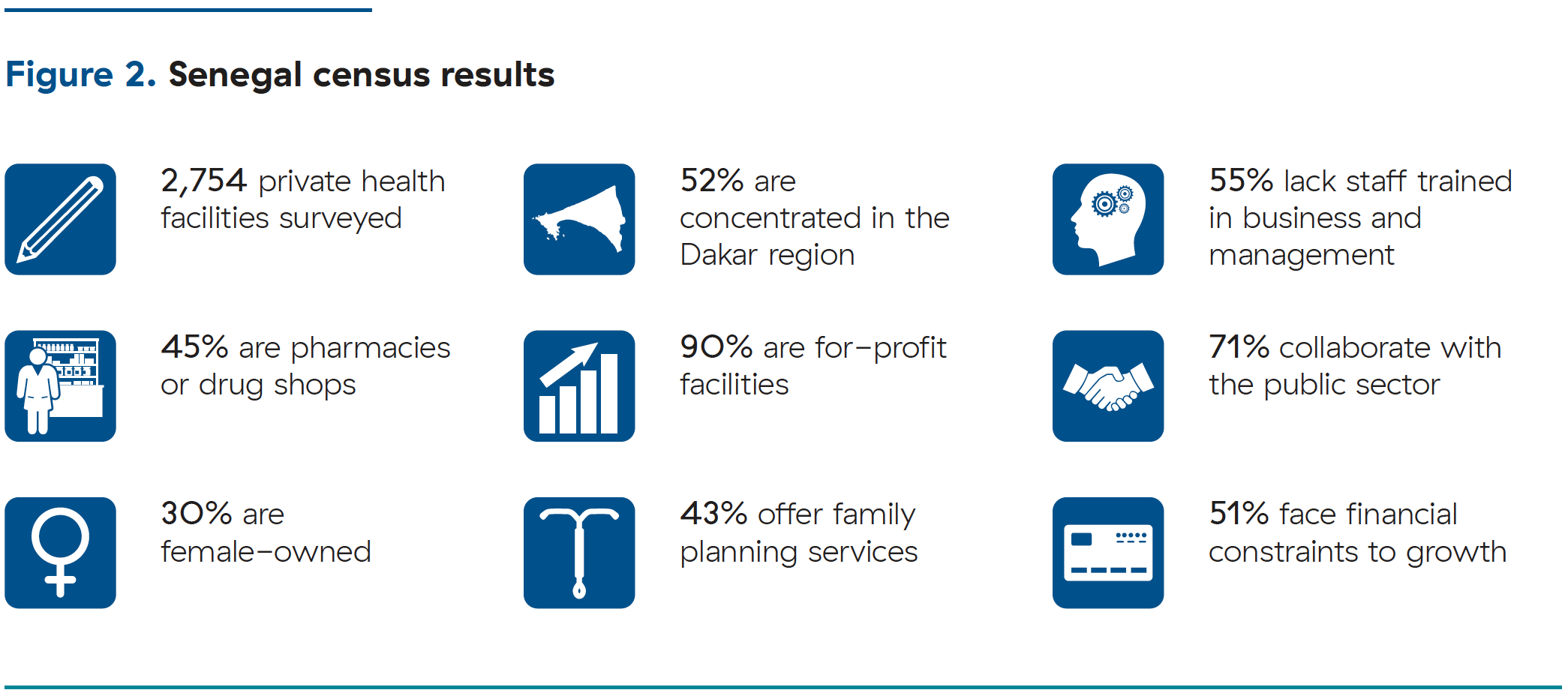Senegal: Generating information on the private health sector
Public-private engagement in health requires a thorough understanding of the private health sector. This includes establishing a reliable knowledge base on the size, scope, characteristics, and needs of the sector to improve collaboration and inform policy decisions.3, 9 Moreover, the routine collection and analysis of information about the sector—such as the number and type of health providers and the type of services they offer—is a critical element of a government’s stewardship function.10 SHOPS Plus supported the first private health sector census in Senegal, which paved the way for greater collaboration between the two sectors.
Context
Consistent with the government of Senegal’s vision to achieve emerging market status by 2035, USAID and the World Bank have supported the government in fostering greater engagement between public, commercial, and nongovernment entities to achieve universal access to health services. In 2014, the Private Health Sector Alliance was formed to bring together various private health sector organizations in the country. At the same time, the Ministry of Health and Social Action (MSAS in French) established the Public-Private Partnership (PPP) Unit and formalized public-private dialogue through a forum (Comité PPP) established by decree and housed within the PPP Unit. These two developments created a centralized hub for public-private dialogue and generated momentum for it. However, despite strong political will by MSAS, efforts to engage the private sector in decision making and implementation of health programs stalled. Part of the challenge was that MSAS lacked accurate knowledge on the true scope and scale of the private health sector.
Approach
In response to the lack of sufficient information on the private health sector, SHOPS Plus supported the first systematic effort to accurately capture and map all private health facilities in the country, gathering information on the number of facilities and their type, location, personnel, and the products and services they offered. Guided by lessons learned from national census efforts in other SHOPS Plus countries,9 SHOPS Plus prioritized local ownership and stakeholder agreement to ensure that the design was context-specific and the findings would be used to inform programming. Multiple meetings spearheaded by the Comité PPP allowed for public-private dialogue to agree on a vision for the census, design and implementation of the study, and how the data would be used. The census activity culminated with national and regional results-sharing workshops that built consensus on the important role of the private sector in health policy and reform and created opportunities for cooperation between the regional and district health authorities and private health facilities in their area. The census identified 2,754 private health facilities (Figure 2), a number substantially different from previous government estimates. The response rate was high: 96 percent of private health facilities welcomed the initiative and agreed to share information. SHOPS Plus facilitated the transition of the census database to the Private Sector Division of MSAS, which currently ensures its routine update. More than 360 new private health facilities have been added to the database since 2018.

The private sector census allowed for public health responses to leverage public and private resources. It enabled the identification of and outreach to private health facilities in the Dakar region during the dengue fever epidemic in 2018. The Private Health Sector Alliance used the census data to set up its regional offices across the country. SHOPS Plus’s local partner, ADEMAS, a social marketing organization, used the census results to identify and train private sector providers on the contraceptive product Sayana Press in USAID priority regions, which resulted in a substantial increase in sales. In 2020, MSAS used the census to design a survey on the impact of the COVID-19 pandemic on private health facilities. Importantly, the census informed and laid the foundation for a number of SHOPS Plus-supported reforms to help integrate the private facilities into the health system and improve their performance.
The private sector census will enable access to a comprehensive database of private sector health facilities in Senegal and will strengthen current interventions, particularly in family planning, HIV/AIDS, and maternal and child health.
Papa Alassane Mbengue
Secretary General, Ministry of Health and Social Action
The reforms included an initiative to incorporate private health sector data into the National Health Information System and DHIS2, an effort to adapt and apply a public sector quality improvement model in the private health sector, and an initiative to provide access to finance and business training to facilities that wish to expand their reach.
| Lessons learned |
|---|
| Knowing private providers’ service offerings, specialties, and locations is essential for effective public-private engagement. This information helps stakeholders build systems that routinely engage all health system entities. |
| The participation of a wide range of stakeholders throughout the data-generating process is instrumental in getting support across the board. It also eases the transition of databases to local ownership and increases the likelihood that the data is used. |